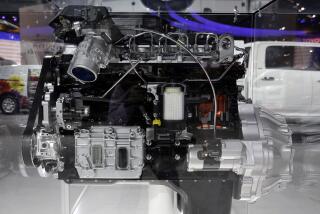Cubic to Pay Army $7.5 Million in Fraud Case
- Share via
The Cubic Corp. has agreed to pay the Army $7.5 million to settle claims that the San Diego-based defense contractor defrauded the government in the production of hand-held mine detectors that ultimately had to be recalled from the field.
The settlement was announced Friday, shortly after two Cubic Corp. employees pleaded innocent in federal court to charges that they falsified test results for the mine detectors.
The actions stem from a 1981 contract awarded to Cubic, a major supplier of electronics systems to the military. Cubic was to produce 2,300 new mine detectors and upgrade 9,500 old ones that had been used during the Vietnam War.
The Army accepted more than 500 of the detectors, which were sent to various military installations, but were recalled before they were used, according to U.S. Atty. Peter K. Nunez.
Cubic is the only U.S. firm that produces the hand-held mine detectors, which it sells to Egypt, Taiwan and Britain, said William G. Stewart Jr., general counsel for Cubic. It is also used in Honduras, according to a company spokesman, who said he is not sure how it got there.
Stewart defended the mine detector Friday, saying: “It is a good product. The Army has not been able to use it or buy it. Other people are using it and it’s working.”
However, William Braniff, the prosecutor in charge of the case, said: “It is the Army’s position they do not satisfy their needs.”
Government officials said Friday that Cubic will not be barred from getting defense contracts because it has demonstrated responsibility in the case and taken the “necessary steps” to avoid a recurrence of the problem. Cubic has annual sales of $360 million, about 40% of which is defense work, mostly U.S. government contracts, a spokesman said.
In a 24-count indictment unsealed Friday, Dennis B. Fink, 39, of San Diego, and William B. Bauder, 55, who has since moved to Tullahoma, Tenn., were charged with conspiring to defraud the United States, falsifying tests, and causing the company to submit fraudulent claims to the Army.
Bauder, who was program manager on the contract, and Fink, a senior engineer, as well as unnamed others falsified the results to deceive the Army into approving mass production of the mine detectors, the indictment charges.
In May, 1982, the indictment charges, Fink developed a computer program known as “FAK IT” for use in the testing. Fink and others then manipulated test results, recorded false scores and failed to report test failures, the indictment says.
In the fall of 1982, Bauder ordered Fink to manipulate tests to achieve passing results and at one point Fink recorded information on the inside of his belt to assist him in manipulating the tests, the indictment says.
Both men are still working for Cubic, but have been transferred from defense-related work, a company spokesman said.
The Army terminated the $7.3-million contract in February, 1984, after learning of the testing irregularities and after it had already paid Cubic $4.3 million.
The $7.5 million will settle a civil suit filed Friday by the Justice Department, which said it was entitled to recover up to three times the amount of any damages suffered. The suit charges that from May through at least October, 1982, Cubic manipulated tests designed to measure the detecting capabilities of the mine detectors, and then falsified test results and reports.
Cubic was awarded the contract in 1981 to be the sole supplier of the mine detectors after successfully completing an Army contract to develop a prototype of the detector. The Army had asked Cubic to improve its existing mine detectors, which were used in Vietnam, and make them capable of performing in arid soil.
The second contract required Cubic to perform tests before starting full-scale production, but those tests were falsified, according to the indictment.
More to Read
Inside the business of entertainment
The Wide Shot brings you news, analysis and insights on everything from streaming wars to production — and what it all means for the future.
You may occasionally receive promotional content from the Los Angeles Times.










